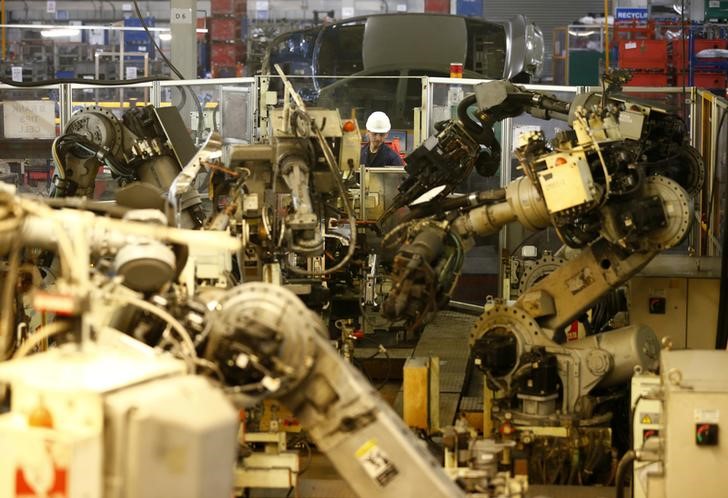By William Schomberg and Andy Bruce
LONDON (Reuters) - British manufacturing slumped unexpectedly in October after a strong September, but economists said the country's economic recovery still looked set to slow only slightly at the end of 2014.
Sterling fell as data showed manufacturing production tumbled 0.7 percent, its first monthly decline since May, hit by a 4.5 percent fall in computer, electronic and optical products, possibly reflecting weak demand among German electronics firms.
Economists said the weakness in the euro zone, Britain's main trading partner, was probably affecting manufacturers although an Office for National Statistics official said no particular impact could be seen in Tuesday's data.
Pharmaceutical and chemical goods also weighed on the factory sector, the ONS said.
Output for industry overall fell 0.1 percent in October having jumped by a revised 0.7 percent in September.
Continued growth in the North Sea oil and gas industry helped offset the drag from manufacturing, although a recent slump in world oil prices could crimp future oil production, said Martin Beck, senior economic advisor to the EY ITEM Club.
Economists had forecast a 0.2 percent increase in industrial and manufacturing output in October. On the year, industrial and manufacturing output were up 1.1 and 1.7 percent respectively.
Despite Tuesday's data there are signs the economy will avoid a sharp slowdown, helped by the boost to consumers from falling oil prices, an incipient recovery in pay growth for British workers and hopes for a recovery in the euro zone. The Bank of England interest rates also remain at record lows, with expectations of when a hike might come having been pushed out.
"Whilst the recovery is currently dependent on the dominant services sector, we are hopeful that it will broaden out again to the manufacturing sector in 2015," said Paul Hollingsworth, an economist with consultancy Capital Economics.
Rob Wood, an economist at Berenberg bank in London, said there was a risk he was being too pessimistic with his forecast of a slowdown in quarterly economic growth to 0.6 percent in the October-December period from 0.7 percent in the third quarter.
A business survey published last week showed manufacturing held up in November as demand from domestic orders offset a fall in export orders.
Britain's recovery, which has been stronger than in other rich economies this year, has so far been driven largely on consumer spending. A retail industry survey on Tuesday showed that a "Black Friday" shopping spree pushed retail sales growth to a three-month high in November.

Manufacturing has yet to recover from its deep slump after the financial crisis. Output is 5.5 percent below its pre-crisis peak, while output in the services sector is already well above.
(Writing by William Schomberg; Editing by Catherine Evans)